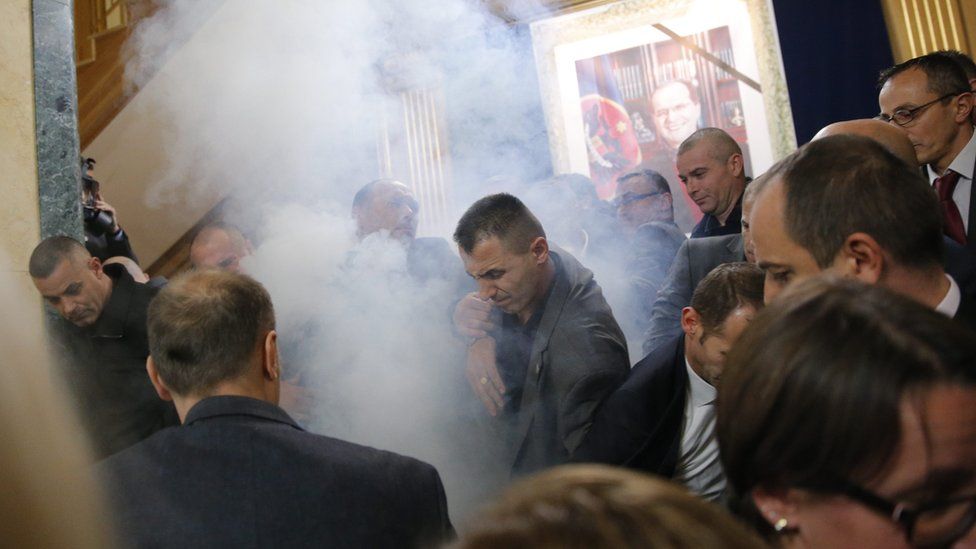Why Kosovo's opposition MPs are tear-gassing parliament
- Published

Pristina may host one of the world's youngest national assemblies - Kosovo unilaterally declared its independence in 2008 - but in recent weeks it has been a global leader in parliamentary dysfunction.
On five separate occasions, opposition parties have used tear gas in the debating chamber and driven MPs out of the assembly.
US Secretary of State John Kerry arrived in Pristina on Wednesday two days after the latest incident. As blocking tactics go, it must seem a world away from US Senate filibusters.
Letting off tear gas certainly seems an extraordinary way to defend democratic principles.
Yet that is what the opposition parties claim to be doing.
This was the moment tear gas was released in parliament on 15 October
Vetevendosje (Self-Determination), led by Albin Kurti, and former Prime Minister Ramush Haradinaj's AAK (Alliance for the Future of Kosovo) say the government has denied debate over agreements made with Serbia to normalise relations.
"We decided to use this strategy - even tear gas - because we had no other way," says Mr Kurti's political adviser, Arber Zaimi. His party leader is currently in detention for his part in the attacks.
"Our action in parliament and on the squares is reaching the international media and international decision-makers. Before, they saw Kosovo as not very relevant when it came to democracy or the opinion of the opposition or the people. Now we have a petition signed by 200,000 citizens and hope international opinion will change."
Tear-gas timeline
- 25 August: Kosovo and Serbia sign landmark deal brokered by EU
- 8 October: Two MPs faint as tear gas let off in national assembly - opposition leader Albin Kurti blamed
- 12 October: Protesters clash with police after Albin Kurti arrested - he is later released
- 15 October: Tear gas let off a second time in parliament
- 23 October: Tear gas let off twice in a matter of hours as opposition seek to cancel Serbia deal
- 17-18 November: Tear gas and pepper spray are let off in parliament, prompting police raid on Albin Kurti's flat and violent protests
- 30 November: Opposition MPs are arrested as tear gas fills parliament for a fifth time
In fact, international decision-makers seem distinctly unimpressed.
After the most recent tear-gas incident, the European Union, which has its largest and costliest diplomatic mission in Pristina, issued an unequivocal statement: "This kind of violent obstruction is neither acceptable nor will it solve any problem for the citizens of Kosovo."
But many local people see things differently.
An opinion poll in the Koha Ditore newspaper this week suggested that Mr Kurti's Vetevendosje is now the second-most popular party in Kosovo, as its long-standing stance against foreign interference has touched a popular nerve.
The catalyst was an agreement struck in August as part of the normalisation process between Kosovo and Serbia, brokered by the EU.
It granted areas with a majority of ethnic Serbs a limited amount of autonomy over local affairs and some funding from Belgrade. That has rung alarm bells among Kosovo's ethnic-Albanian majority, who fear a ruinous division, similar to Bosnia, might develop.
"The process was not inclusive or transparent, from the very beginning, and it did not address the needs of Kosovo Serbs, but the needs of Serbia in Kosovo," says Besa Shahini, founder of the Kosovar Stability Initiative and now an independent analyst.
She believes that while most people do not support the opposition's tactics, they are weary of the EU's approach.
"The problem with the EU is that the Brussels Dialogue is their project, thus any criticism of it feels like a personal affront to [the EU]. As a result they protect the project blindly and condemn anyone who criticises."
But the government insists that normalising relations with Serbia is the only way forward. Kosovo's independence has not been recognised by five EU member states or scores of other countries, including Brazil, China, Russia and India.
It is not a member of the United Nations and does not even have an international telephone dialling code, although it would have its own number under the Brussels deal.
Ardian Arifaj, a political adviser to the Ministry of Foreign Affairs, says the agreement with Serbia is being used as a pretext to destabilise the government.
"Some parties in the opposition want to get to power using any means," he says.
"In this case, they're using the agreement as a justification. They haven't made any convincing arguments that the agreement is not in the interests of Kosovo.
"We will continue the dialogue with Serbia and implement everything that's been agreed. It's in the interests of Kosovo and the region, plus the international community in the region."
With neither side currently willing to bend, Kosovo's National Assembly may not be a place to breathe easily for some time to come.
- Published15 October 2015
- Published8 September 2015
- Published22 March 2015
- Published28 June 2023